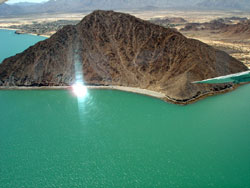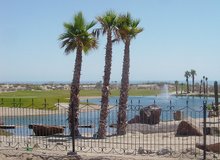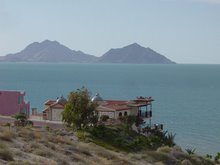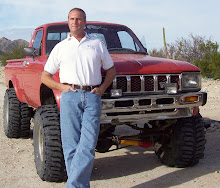Trump pulls name out of Baja development
By Sandra Dibble
Union-Tribune Staff Writer
2:00 a.m. February 11, 2009
A billboard featuring Donald Trump towers over a development site in October 2007. The billboard was still up last week. (Union-Tribune file photo) -
TIJUANA — Fueled by rapidly rising U.S. real estate prices, the Baja California coastline was booming in October 2006 when Donald Trump lent his name to a planned luxury condo-hotel development overlooking the Pacific Ocean.
But as a global credit crisis envelops the real estate market on both sides of the border, the famed New York real estate mogul has severed his ties with the much-touted project known as Trump Ocean Baja Resort.
Planned on a 17-acre site about 10 miles from the U.S.-Mexico border, the project envisioned 526 units that ranged in cost from $300,000 to $2.5 million. The project has yet to break ground.
The developer late last year informed purchasers that it still was looking for loans and that the purchasers' deposits, totaling more than $32 million, had been spent, according to a document obtained by The San Diego Union-Tribune.
Experts say the project's financing difficulties reflect the changing real estate climate, a situation that is not unique to Baja California nor to the Trump development. But many purchasers, most of them from the United States, have said that Trump's association with the project had made them feel it would be a secure investment.
“I bought this development for one reason, and one reason only – the Trump name,” said Gregory Starn, 47, a U.S. citizen living in Cancun, Mexico, who in 2006 signed a contract for a studio apartment costing $437,000 – but now wants the developers to return his deposit of more than $80,000.
“I'm afraid that without Trump's name, it's less likely the developer will be able to arrange financing,” said Robert Culbertson, 59, a stockbroker from Orlando, Fla., who put down a 30 percent deposit on a one-bedroom unit.
Trump told the Union-Tribune in a 2006 interview that the Trump organization would be a “significant” equity investor; yet he never put his own money into the project, according to the developer. Rather, Trump, who stars in his own television show, “The Celebrity Apprentice,” allowed the developers to use his name on the project through a license agreement.
That arrangement was terminated last month.
“The developer did not comply with certain terms of the license agreement, including the deadlines to obtain construction financing and begin construction,” Trump's executive assistant, Rhona Graff, said in an e-mail.
A billboard with Trump's photograph still loomed over the site one afternoon last week, abandoned save for a security guard at the entrance. Trump's erstwhile partner in the project, Los Angeles-based Irongate, did not return telephone calls.
The numbers for sales agents, attorneys, public relations firms and the escrow company listed on legal documents either did not work or went into voice mail. The project's Web site was recently removed.
A Mexican company, PB Impulsores, is listed as the developer on legal documents. Jorge Torres, named on one document as the company's representative, said last week in a telephone interview from Mexico City that he was not at liberty to talk about the project.
An e-mail sent out by PB Impulsores to purchasers Jan. 28 said that given Trump's termination of the license and pending litigation, “the developer will provide no further comment concerning the project.”
The purchasers' predicament highlights the common practice of using deposits from pre-construction sales to finance development of many Baja California coastal projects.
“We always recommend that buyers read the documentation,” said Ross Buck, president of a the Rosarito Beach branch of AMPI, a national real estate agents group. “It will clearly state how the funds are to be used, if they are able to be used.”
Under California law, builders must keep deposits in escrow or post bonds to protect the funds, said Chris Neri, assistant commissioner of the California Department of Real Estate. Neri added that “a good percentage of builders hold the money in escrow.”
Baja California law allows deposits to be used to finance projects, but only if a series of conditions are met, said Rafael Gama Pérez, a Tijuana attorney who frequently represents U.S. citizens buying coastal property in Baja California. In cases where a builder is determined to have broken the contract, investors are entitled to the return of their deposit plus interest, he said.
“The issue is whether the defendant has the resources to guarantee repayment,” Gama said.
With the heady Baja boom days over, some experts see an end to such financing arrangements for unbuilt projects.
“The market can now settle down to the real world of brick and mortar, finished properties for people who really want to live there, as opposed to speculators,” said Brian Flock, a longtime real estate agent in the region. “The people that I'm talking to these days have some connection to Baja.”
Gama, the Tijuana attorney, believes there will be room for a range of projects, including luxury developments and retirement communities.
“The opportunities will be there, as will the people to take advantage of them,” he said. And with the days of easy credit now over, “the buyers are going to be more solid.”
Wednesday, February 11, 2009
Subscribe to:
Post Comments (Atom)








No comments:
Post a Comment